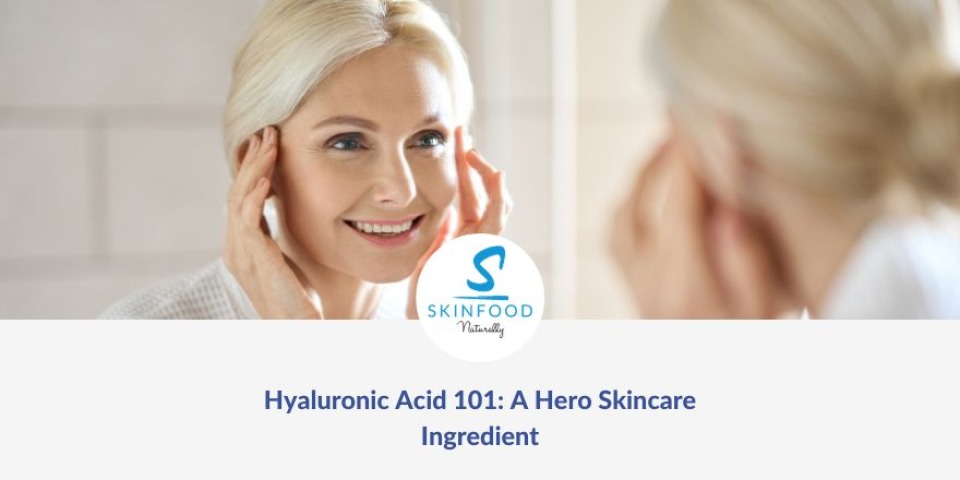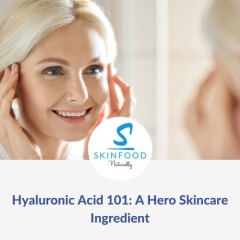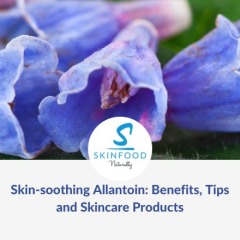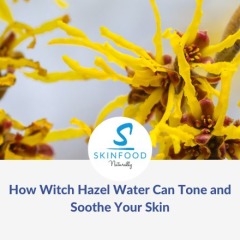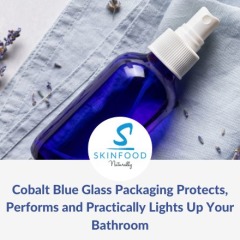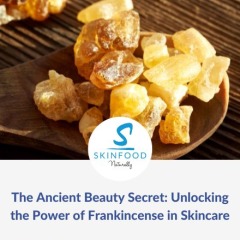Hyaluronic acid, a substance your body knows well, becomes a cherished ally as you age, helping you maintain a fresh and healthy-looking appearance you adore.
The popular ingredient in many daily skincare routines can help your skin feel and look its best, tapping into values of deep nourishment and lasting hydration all year round.
What is hyaluronic acid?
Hyaluronic acid is a substance found naturally in the human body. It is a clear, viscous fluid produced by the body’s cells. It is located in the spaces between the cells in the body and plays a crucial part in many bodily functions, including lubrication of the joints and eyes and wound healing.
Hyaluronic acid is a polysaccharide naturally occurring in the body at an intracellular level in connective tissues, especially the skin. “It has humectant properties and can be both elastic and flowing, so it plays a crucial role in protecting and stabilising the skin at a cellular level,” says Sarah Butler, Founder of Skinfood Naturally.
It is broken down and synthesised in the body, and our skin can make less as we age. As a result, our skin can dry out and lose its ability to retain moisture and elasticity. Hyaluronic Acid has an affinity to water and can bind up to 1000 times its volume in water, making it an excellent humectant.
Hyaluronic acid in skincare
Hyaluronic acid skincare products are specially formulated items you can include in your daily routine to harness this powerful ingredient’s moisturising and anti-ageing benefits. Imagine your skin, regardless of type, receiving a refreshing drink of water. That’s what hyaluronic acid does—deeply hydrating and infusing your skin with moisture, creating a healthy-looking appearance.
Hyaluronic acid forms a thin, permeable, light, and viscoelastic film on the surface of the skin, which helps rejuvenate the appearance of dull, dry skin and improves elasticity to help skin look plump, feel supple and hydrated and so reduces the signs of ageing and the appearance of fine lines and wrinkles.
The popular ingredient helps boost the skin’s collagen production and aids water retention, increasing skin hydration. Compounds in hyaluronic acid, including glucose and yeast, have emollient, skin conditioning and humectant properties.
A good source of Vitamin B and Beta-Glucan, which works to calm and soothe irritated skin and plump and firm fine lines and wrinkles. Along with its anti-inflammatory properties, hyaluronic acid is also an antioxidant, helping to protect against free-radical damage.
Skincare products with hyaluronic acid range from serums to creams, each designed to attract and retain water within the skin layers. As you blend these into your routine, you’ll notice diminished fine lines and a fortified skin barrier, protecting you from environmental stressors. The ingredient is found in many skincare products, including moisturisers, serums, sheet masks, eye creams, cleansers and lip treatments.
Hyaluronic acid is also a popular skincare ingredient found in many sunscreen products. Sun exposure can lead to dry skin, making sunscreen with the ingredient an essential step in maintaining moisture levels. It has been shown to help counter the accelerated ageing process by exposure to UV radiation from the sun.
The incredible molecule, deeply embedded in your skin’s architecture, keeps your complexion quenched and resilient. Every drop of hyaluronic acid serum is like a hydration hero, working tirelessly to bind water to your skin, ensuring it’s not just surface-level moisture but deep, sustaining skin hydration.
Benefits of hyaluronic acid
Diving into the benefits of hyaluronic acid, you’ll find that this powerhouse ingredient not only quenches your skin’s thirst but also significantly diminishes the tell-tale signs of ageing. Incorporating hyaluronic acid into your skincare routine embraces beauty and the health and vitality of your skin.
Considering the universal benefits of hydration and anti-ageing, you’ll find that hyaluronic acid is an ideal addition to anyone’s skincare routine. It’s perfect for you if you’re looking to:
-
Keep your skin hydrated
-
Combat dryness, especially in harsh climates
-
Lock in moisture for a dewy complexion
-
Hydrate and smooth the appearance of your skin
-
Minimise the visibility of fine lines and wrinkles
-
Provide a smooth canvas for makeup application
-
Address signs of ageing
-
Prevent the development of new wrinkles
-
Improve overall skin texture
-
Help manage dry, cracked skin
-
Reduce inflammation
-
Help fade scars
One of the standout hyaluronic acid benefits is its unparalleled ability to increase skin moisture, ensuring your complexion stays supple and hydrated throughout the day. Moreover, it works tirelessly to reduce the appearance of wrinkles, giving your skin a smoother, more youthful look. You can also notice an improvement in skin elasticity, contributing to a firmer feel and tighter skin tone.
Whether you have dry, oily, or combination skin, incorporating hyaluronic acid can help you maintain a radiant and youthful appearance.
The science behind hyaluronic acid
Beneath the surface of your skin, hyaluronic acid functions as a powerful hydrator, binding to water molecules to maintain moisture and support skin elasticity.
“Hyaluronic acid occurs naturally in our bodies, but hyaluronic acid for cosmetic use must be synthesised in a lab through a biotechnological fermentation process between glucose and yeast,” shares Sarah. “Traditionally, hyaluronic acid was derived from cockerel combs, and at Skinfood Naturally, we do not use any ingredients derived from animal sources,” Sarah adds.
Molecular weight matters when it comes to our skincare products and the ingredients in them. Hyaluronic acid with a low molecular weight penetrates deeper, promoting skin hydration from within. High molecular weight provides surface-level moisture, offering immediate water retention and a plump appearance.
Hyaluronic acid supports collagen, which relies heavily on the ingredient for the hydration necessary to remain supple and strong. It also maximises water retention as it acts as a humectant, drawing moisture into the skin, vital for long-lasting hydration.
“Hyaluronic acid is naturally present in our bodies, and the amount of it in our skin accounts for a third of the entire amount in the body,” Sarah explains. “Our skin has a naturally slightly acidic pH of 4.5-5.5, so light acidic ingredients do not harm the balance if used correctly and strict cosmetic recommendations are followed,” Sarah details.
Frequently Asked Questions
Should I use retinol or hyaluronic acid?
When deciding between retinol and hyaluronic acid, it’s essential to understand their distinct benefits for your skin’s health and appearance. Retinol, a form of vitamin A, is a popular ingredient that accelerates skin renewal, reduces the appearance of wrinkles, and contributes to healthy-looking skin.
Meanwhile, hyaluronic acid is your go-to for deep hydration, plumping the skin, and minimising fine lines with its moisture-binding properties. You don’t have to pick sides in your journey for radiant skin. Many skin care products combine both ingredients to target signs of ageing while ensuring ample hydration. Feel embraced by the community of beauty enthusiasts who’ve integrated this duo into their routines.
Retinol or hyaluronic acid-based products first?
While deciding whether to apply retinol or hyaluronic acid first in your skincare routine, it’s essential to understand their unique functions and how they can complement each other.
Incorporating hyaluronic acid before retinol can significantly benefit your skin.
We advise hyaluronic acid first because it hydrates the skin by preparing it and delivering deep hydration. It also protects by maintaining moisture to offset retinol’s drying effects and enhances through improving skin texture for better retinol application.
Is it safe to use hyaluronic acid every day?
Yes, you can use hyaluronic acid daily! It’s safe for all skin types and helps maintain your skin’s moisture, keeping it plump, fresh, and less prone to oiliness that can clog pores.
Hyaluronic acid is gentle on the skin and safe for daily use. It can also be combined with other products as it pairs well with most skincare items.
You can safely incorporate hyaluronic acid into your daily facial skincare routine to maintain hydration and elasticity. This powerhouse ingredient is safe for everyday use but has many skin benefits, making it a staple in many topical products.
Is hyaluronic acid safe for long-term use?
Understanding the sustainability of hyaluronic acid in your skincare routine is crucial as you consider its long-term effects on skin health.
Hyaluronic acid is considered safe for long-term use:
-
Natural component: Hyaluronic acid is part of your skin’s connective tissue.
-
Retaining moisture: Continuously helps maintain skin moisture.
-
Minimal side effects: Rarely causes adverse reactions when used topically.
Are there instances when you should avoid hyaluronic acid?
Your skin’s health and safety are paramount, and you’re not alone in experiencing sensitivities. If you’re dealing with compromised skin or specific skin conditions, always seek advice from a dermatologist or cosmetic scientist before trying new products.
Can too much hyaluronic acid damage the skin?
More isn’t always better. Overuse can lead to issues, especially if you need to consider the concentration and different molecular weights of hyaluronic acid in your products.
Here’s what you might notice:
-
Hydration overload, indicated by puffiness and over-saturation, leads to imbalanced skin.
-
Irritation potential from preservatives in high-concentration formulas and reactions to lower molecular weights that penetrate deeply
-
Effectiveness concerns as higher molecular weights might not be absorbed effectively. The best balance is often found in products combining different types of hyaluronic acid.
